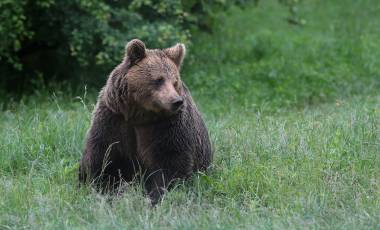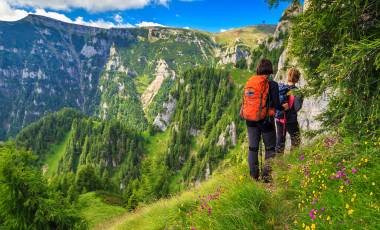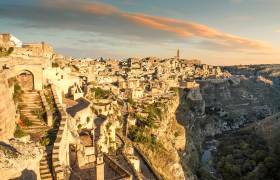Located in southern Bulgaria, the Rodopi Mountains, form part of the Balkan Peninsula mountain range and even stretch into northern Greece. Boasting dense oak forests, sweeping alpine meadows and deep river gorges, the Rodopi Mountains are also home to a fascinating array of wildlife including the Eurasian lynx, European wildcat, roe deer and a variety of birds such as eagles, hawks and songbirds. But one of the most elusive animals you’ll find in the Rodopi Mountains is the brown bear (Ursus arctos).
Despite brown bears being ecosystem engineers that play an essential role in maintaining biodiversity and ecological balance in the region, their numbers have sadly declined over recent decades due to habitat loss, poaching, and the rise in human-wildlife conflict. However, thanks to ongoing conservation initiatives in the region, through habitat preservation, anti-poaching measures and public awareness campaigns, brown bears are increasingly seen as a protected species. And Julian Perry, our Bulgarian Tour Operator, expert local guide and avid conservationist, knows this region’s flora and fauna like the back of his hand. Read on as he shares his experience of guiding in the Rodopi Mountains, how he launched his own brown bear conservation project and what makes our Bulgaria: Realm of the Brown Bear trip unique.
“Rolling away towards the distant horizon and the border with Greece, the rippling green ridges of the Bulgarian Rodopi Mountains stretch out in front of us like the waves of a turbulent sea. We are perched high up on a rugged karst limestone outcrop, enjoying a well-earned picnic lunch. Above our heads, screaming parties of Alpine Swifts wheel back and forth, silhouetted against the azure sky, along with a juvenile Peregrine Falcon, honing its aerobatic skills. On the crags beside us, a flickering of crimson wings suddenly catches the eye, an exciting but all too fleeting glimpse of an elusive Wallcreeper, fluttering with its distinct butterfly-like flight. Lower down on the screen, several Balkan Chamois move fleet-footed across the unstable rocks, dislodging a small boulder that tumbles down the slope.”
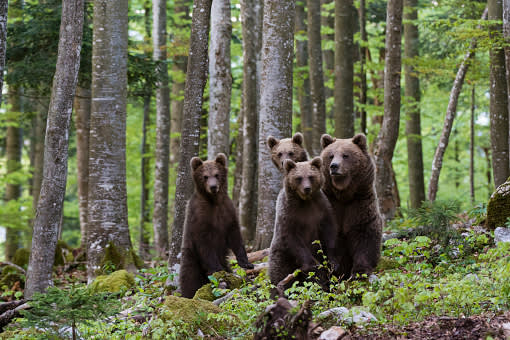
“The excitement seemingly over, everyone turns their attention back to their sandwiches, but I keep my binoculars raised to my eyes, scanning a sparse belt of scrubby trees and bushes below us. Was that a movement? Yes, a dark brown shape appears from behind a bush, shortly followed by two smaller ones. “A mother bear and two cubs!”, I call out. Quickly everyone springs back to their feet, and we are all soon watching the family of bears moving carefully across a small spur, flipping over rocks as they search beneath for ants and other invertebrates to eat. It’s a magical moment, one that lasted about ten minutes, but the memories of which will last a lifetime!”
“Bulgaria is currently home to a population of just over 500 Brown Bears, of which about half inhabit the Rodopi Mountains. The latest scientific data suggests that the bear population in the country is starting to decline, but at the same time, there seem to be more and more media reports of human-bear encounters and conflicts. For generations, local people in the Rodopi Mountains have peacefully cohabited with the bears, but unfortunately, during the last decade, tensions have been increasing and tolerance declining. All too often, the bears are now being labelled as a “problem”, whereas in reality, the problem is actually the increasing anthropogenic disturbance and encroachment into the bears’ core habitats.”

“Having spent the last thirty years exploring the Rodopi Mountains on foot, studying the bears and other wildlife, and leading Exodus groups through this stunning region, I decided to launch a brown bear conservation project, focused on fostering a more convivial coexistence between the local people and the bears with which they share the landscape. As part of the project, Exodus launched their trip: Bulgaria: Realm of the Brown Bear. Based in the remote mountain village of Yagodina, this exciting wildlife conservation holiday offers a unique in-depth discovery of the ecology and behaviour of European brown bears, and how their lives are intimately entangled with those of the local people and the other wildlife.”
“Despite having only been running for a few years, the “Realm of the Brown Bear” holiday has already been having a significant conservation impact. With the Exodus groups staying for six nights in a small family-run hotel in the heart of the village of Yagodina and eating delicious traditional cuisine based on locally sourced produce, our presence directly benefits the local economy. With villagers now understanding that it is the bears that are the attractors, they no longer see them as a “problem”. Furthermore, with the bears having started to draw Exodus clients from as far afield as America and Australia, many villagers now express a sense of pride in “their bears” and thus have a new-found enthusiasm to protect them!”

“During our daily bear tracking hikes, we explore the “Realm of the Brown Bear” on foot, searching for, recording and interpreting signs of bear activity, including tracks, scats and ransacked ant nests. However, some of the most fascinating signs are bear scent marking posts, which can be found dotted throughout the forests. The bears are highly selective about what to use for the purpose, preferring large, conspicuous trees. Unfortunately, because of their size and the volume of timber they offer up, such trees are also frequently targeted for felling by foresters. This can negatively impact local bear populations, as these trees play an important role in brown bear social organisation and reproduction. Thankfully, increasing local sympathy towards the bears means that when we find such trees during our tracking walks, and report them to the local foresters in Yagodina, they are now much more willing to spare these rub trees from their chainsaws.”
“The Rodopi Mountains are one of the most important biodiversity hotspots in Europe, harbouring an amazingly diverse flora and fauna, including many endemic and relict species. During the course of our daily wanderings, we pass through an ever-changing succession of habitats, including ancient forests, flower-rich hay meadows, lush river valleys, and dramatic rock outcrops and ridges. Here, we have a chance to find and observe a wonderful assortment of wildflowers, butterflies and other animals. What makes the region so enticing to the nature lover is the fact that many of the remoter corners of the mountains remain unexplored, meaning there is always the chance of making an exciting new discovery.”
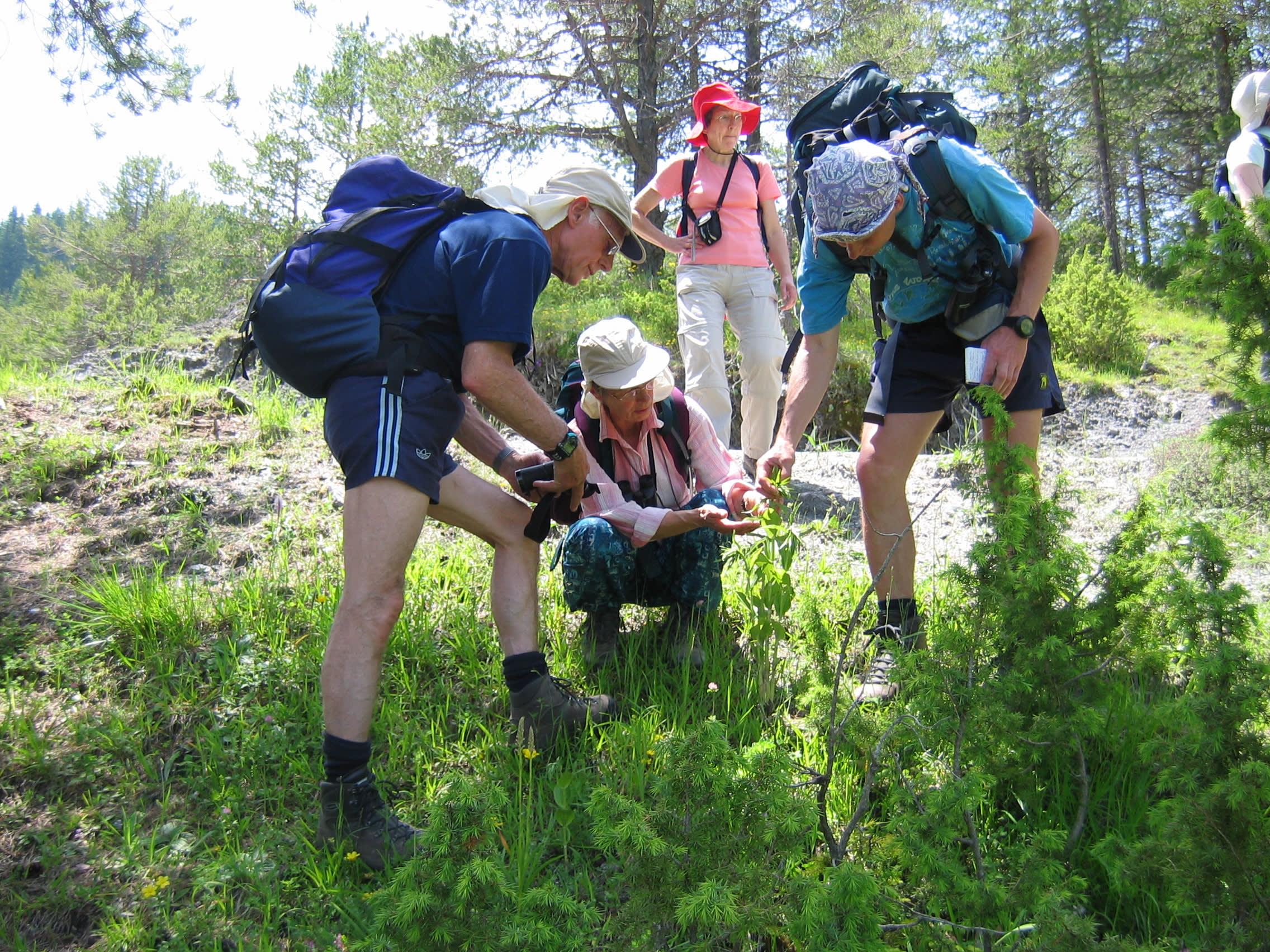
“Over the years, our Exodus groups have found important new sites for many rare species. In particular, we have discovered several orchids of great conservation significance. These have included new populations of Ghost Orchid, Spitzel’s Orchid, Pink Butterfly Orchid, Fly Orchid, and most excitingly of all, Lady’s Slipper Orchid. The latter species was believed to have been restricted to just one locality in Bulgaria, but during one of our holidays, we discovered several specimens growing in an entirely new location. This turned out to be the most south-eastern outpost of Lady’s Slipper Orchid in Europe and is now the subject of careful monitoring by botanists from the Bulgarian Academy of Sciences. Walking in the Rodopi Mountains is, as one Exodus client commented, “like walking in the Garden of Eden”, particularly in June, when every trail is lined by orchids, and the flower-filled meadows are alive with a kaleidoscope of colourful butterflies, including the beautiful Apollo.”

“Autumn brings different delights, particularly in October when the previously green mountain forests become burnished spectacularly with golds, yellows and reds. It is at this time of year that the bears are active, busily feeding up on the wealth of wild fruits and berries before going into their winter torpor. In autumn, some of the more elusive forest birds can also become more conspicuous, with Nutcrackers, Crested Tits, Hazel Grouse and both Black and Grey-headed Woodpeckers ranking among the highlights for birdwatchers. One group were even lucky enough to see a pair of exceptionally rare Three-toed Woodpeckers.”
“On several evenings during the week, we visit a mammal-watching hide situated in a quiet forest glade. When they appear, the brown bears are of course the main attraction, but in terms of sheer entertainment, nothing can rival the antics of a large group of argumentative wild boars, especially when the family includes half a dozen or more humbug-striped piglets. On one evening each week, when not visiting the hide, I always try to offer a bat walk in and around the village. Using an ultrasonic detector, we usually manage to hear an interesting variety of species, particularly in late autumn when the main breeding season is in full swing, and the bats are emitting their distinctive social calls. The acoustic records we make are contributing to a local bat conservation project we have recently initiated. Hopefully, this project will be as equally successful as our bear project and encourage local people to become more aware of the region’s bats and more committed to their protection.”
“If you are looking for an exciting wildlife experience, then come to the Rodopi Mountains and join me on the Realm of the Brown Bear trip. This unique immersive holiday will not only offer a chance to observe and learn about the bears and the other wildlife with which they share the mountains, but you will also be playing your part in helping to foster convivial coexistence between the human and non-human inhabitants of this beautiful region.”
If you’re keen to join expert leaders like Julian on a walk through the wildlife-rich Rodopi Mountains, find out more about our Realm of the Brown Bear trip by clicking here.

